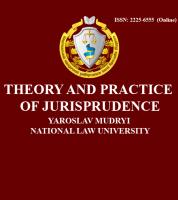Проблеми забезпечення безпеки України в контексті політики НАТО щодо Російської Федерації
Problems of the security support in Ukraine in the context of the NATO’s policy regarding the Russian Federation
Author(s): І. V. Yakovyk, A. R. TragnyukSubject(s): Politics / Political Sciences, Law, Constitution, Jurisprudence, Security and defense
Published by: Національний юридичний університет імені Ярослава Мудрого
Keywords: security; crisis; interstate relations; Ukraine; NATO; Russian Federation;
Summary/Abstract: The crisis in Ukraine is a potential turning point in Euro-Atlantic security. The European security landscape is changing, the crisis creates new security realities during the twenty-first century and requires a significant response from NATO. At the same time, however, the crisis is the crystallisation of a number of wider and longer-term problems that have been increasingly visible for some time, most notably the intensifying sense of strategic dissonance between Russia and the West.Indeed, today’s crisis illuminates very clearly the point that Moscow understands European security in very different conceptual terms from the West.The article states that NATO during the past 20 years – up to the Ukrainian crisis – has considered Russia a partner with which the Alliance could cooperate. However, the Russian-Ukrainian conflict changed these relations.Years 2014–2017 witnessed rising levels of instability and complexity in the Eastern Partnership region caused by both internal and external factors. It is in the strategic and current interests of the Euro-Atlantic community to support the countries of Eastern Europe, including Ukraine, in their strife for peace, security, maintenance of sovereignty and continuing their paths towards successful democratic transition.The American commitment to European defense lies at the heart of the transatlantic bargain that defines NATO. Washington reacted to the end of the Cold War by significantly reducing its troop presence in the European theatre. Simultaneously it made clear that at the institutional level no other organization could substitute for the Atlantic Alliance as the anchor of a newEuropean security order.NATO's ties with Russia and Ukraine may be depicted as a triangle, with each leg representing a significant set of bilateral interactions. But the relationship as a whole has a larger importance, and is integral to the effort to recast NATO's post-Cold War responsibilities. NATO's ties with the Russian Federation, burdened by a legacy of rivalry and distrust, are of particular salience. The Alliance's agenda for a transformed Euro-Atlantic security order cannot be fulfilled without Russian engagement. Ukraine defines a "European Choice" as the central pillar of its foreign policy, but it is constrained by a legacy of backwardness, and by a complex relationship with its Russian neighbor. Though it is a troubled polity, as a major regional power Ukraine is too important for the Alliance to ignore. If these relationships develop and prosper, the Alliance's potential as a collective security forum can be realized to the full, and its vocation as a “zone of peace” will be greatly expanded.The article defines the factors which couse the nessecity of renovation of the NATO’s Strategy on security support in Eastern Europe, particulary in Ukraine. And the directions of such renovation are outlined.
Journal: Теорія і практика правознавства
- Issue Year: 2/2017
- Issue No: 12
- Page Range: 1-19
- Page Count: 19
- Language: Ukrainian

